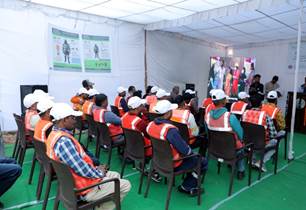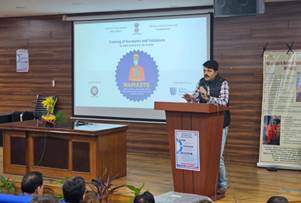The National Action for Mechanized Sanitation Ecosystem (NAMASTE) Scheme signifies a monumental shift in India’s approach to sanitation work, aiming to elevate the status of the profession and ensure the safety, well-being, and empowerment of sanitation workers. This ambitious initiative, jointly launched by the Ministry of Social Justice and Empowerment and the Ministry of Housing and Urban Affairs, marks a crucial step towards eliminating manual scavenging, protecting the dignity of sanitation workers, and revolutionizing how sanitation services are delivered across the country.
 The NAMASTE scheme boasts a comprehensive array of benefits designed to empower and uplift sanitation workers, often referred to as Sewer and Septic Tank Workers (SSWs):
The NAMASTE scheme boasts a comprehensive array of benefits designed to empower and uplift sanitation workers, often referred to as Sewer and Septic Tank Workers (SSWs):
- Creating a National Database: By profiling SSWs across all Urban Local Bodies (ULBs) in India, the scheme aims to create a centralized database containing vital information about these workers. This facilitates identification and allows for the allocation of targeted support and resources. Each profiled SSW will receive a unique NAMASTE ID, further streamlining the process of providing them with benefits and opportunities.
- Equipping Workers with the Necessary Tools: The scheme acknowledges the critical role of proper equipment and training in ensuring the safety and efficiency of sanitation work. It provides SSWs with essential Personal Protective Equipment (PPE) kits to safeguard their health and minimize exposure to hazardous materials. Additionally, safety devices are distributed to Emergency Response Sanitation Units (ERSUs), further enhancing their ability to handle potentially hazardous situations.
- Investing in Health and Well-being: Recognizing the inherent risks associated with sanitation work, the scheme ensures comprehensive health insurance coverage for SSWs under the Ayushman Bharat- Pradhan Mantri Jan Arogya Yojana (AB-PMJAY). This vital initiative provides them with access to essential healthcare services and financial protection in case of medical emergencies.
- Upskilling and Livelihood Opportunities: The scheme goes beyond immediate needs by fostering long-term empowerment through occupational safety training. This equips SSWs with the necessary skills and knowledge to perform their duties safely and effectively. Additionally, the scheme encourages and supports the establishment of sanitation enterprises through subsidized sanitation-related vehicles and equipment. By empowering SSWs to become sanipreneurs, the scheme provides them with sustainable livelihood opportunities and paves the way for a brighter future within the sanitation sector itself. This not only improves their economic well-being but also fosters a sense of agency and ownership, contributing to their overall empowerment.
To ensure the successful execution of the NAMASTE scheme, a multi-pronged approach is being adopted:
- Extensive Training Programs: Online training sessions have been conducted for ULB Nodal Officers and surveyors across all states and union territories, equipping them with the necessary expertise to utilize the NAMASTE mobile application effectively and conduct comprehensive profiling of SSWs. Additionally, Training of Trainers (ToT) programs have been organized in several states, empowering individuals to train others within their respective regions, ensuring widespread knowledge dissemination and effective implementation at the local level. This capacity-building effort not only equips relevant personnel with the necessary technical skills but also fosters a sense of ownership and responsibility among stakeholders at various levels, crucial for the long-term success of the scheme.
- Nationwide Profiling Campaign: Following the training programs, a nationwide profiling campaign has been initiated. As of March 6, 2024, over 28,000 SSWs have been surveyed across 28 states, with over 21,000 individuals successfully validated. This crucial phase allows for the identification and registration of SSWs, paving the way for them to benefit from the various entitlements offered by the scheme. By creating a comprehensive database, the scheme not only facilitates the effective delivery of benefits but also provides valuable insights that can inform future policy decisions and resource allocation strategies.
- IEC Campaign and Awareness Generation: To garner public support and ensure the successful implementation of the scheme, an Information, Education, and Communication (IEC) campaign is being conducted across India. Utilizing various media channels, including print, electronic, and mass media, the campaign aims to raise awareness about the importance of sanitation work, emphasize the dignity and rights of SSWs, and garner public support for the initiative. This multi-pronged approach not only fosters a more inclusive and supportive environment for SSWs but also encourages behavioural change within the community, leading to a greater appreciation for sanitation work and the vital role SSWs play in maintaining public health.




